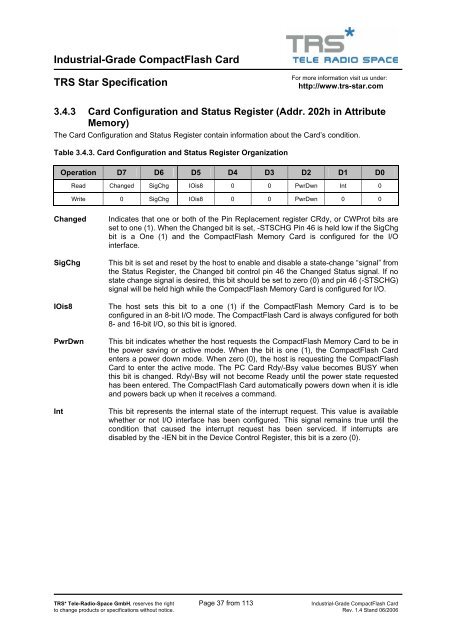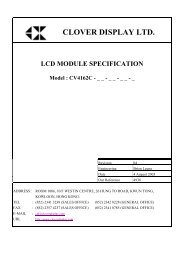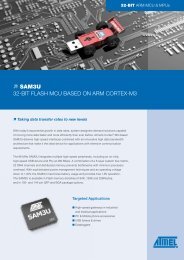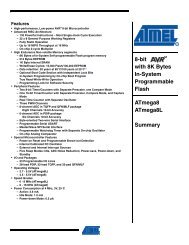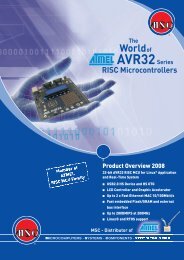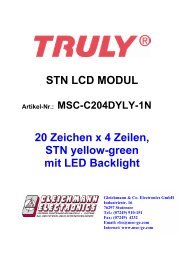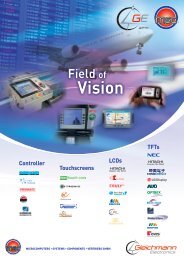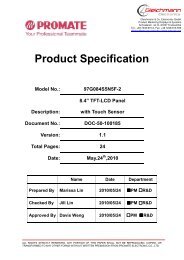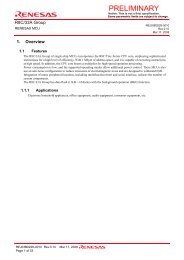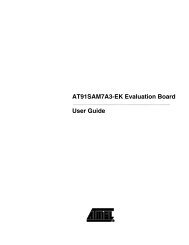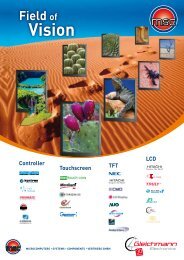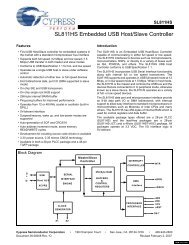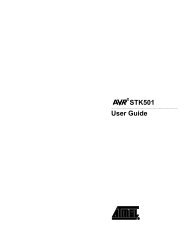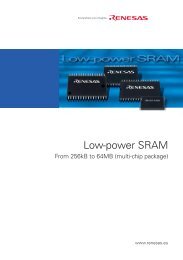TRS Star CompactFlash Card Industrial-Grade Datasheet
TRS Star CompactFlash Card Industrial-Grade Datasheet
TRS Star CompactFlash Card Industrial-Grade Datasheet
- No tags were found...
You also want an ePaper? Increase the reach of your titles
YUMPU automatically turns print PDFs into web optimized ePapers that Google loves.
<strong>Industrial</strong>-<strong>Grade</strong> <strong>CompactFlash</strong> <strong>Card</strong><strong>TRS</strong> <strong>Star</strong> SpecificationFor more information visit us under:http://www.trs-star.com3.4.3 <strong>Card</strong> Configuration and Status Register (Addr. 202h in AttributeMemory)The <strong>Card</strong> Configuration and Status Register contain information about the <strong>Card</strong>’s condition.Table 3.4.3. <strong>Card</strong> Configuration and Status Register OrganizationOperation D7 D6 D5 D4 D3 D2 D1 D0Read Changed SigChg IOis8 0 0 PwrDwn Int 0Write 0 SigChg IOis8 0 0 PwrDwn 0 0ChangedSigChgIOis8PwrDwnIntIndicates that one or both of the Pin Replacement register CRdy, or CWProt bits areset to one (1). When the Changed bit is set, -STSCHG Pin 46 is held low if the SigChgbit is a One (1) and the <strong>CompactFlash</strong> Memory <strong>Card</strong> is configured for the I/Ointerface.This bit is set and reset by the host to enable and disable a state-change “signal” fromthe Status Register, the Changed bit control pin 46 the Changed Status signal. If nostate change signal is desired, this bit should be set to zero (0) and pin 46 (-STSCHG)signal will be held high while the <strong>CompactFlash</strong> Memory <strong>Card</strong> is configured for I/O.The host sets this bit to a one (1) if the <strong>CompactFlash</strong> Memory <strong>Card</strong> is to beconfigured in an 8-bit I/O mode. The <strong>CompactFlash</strong> <strong>Card</strong> is always configured for both8- and 16-bit I/O, so this bit is ignored.This bit indicates whether the host requests the <strong>CompactFlash</strong> Memory <strong>Card</strong> to be inthe power saving or active mode. When the bit is one (1), the <strong>CompactFlash</strong> <strong>Card</strong>enters a power down mode. When zero (0), the host is requesting the <strong>CompactFlash</strong><strong>Card</strong> to enter the active mode. The PC <strong>Card</strong> Rdy/-Bsy value becomes BUSY whenthis bit is changed. Rdy/-Bsy will not become Ready until the power state requestedhas been entered. The <strong>CompactFlash</strong> <strong>Card</strong> automatically powers down when it is idleand powers back up when it receives a command.This bit represents the internal state of the interrupt request. This value is availablewhether or not I/O interface has been configured. This signal remains true until thecondition that caused the interrupt request has been serviced. If interrupts aredisabled by the -IEN bit in the Device Control Register, this bit is a zero (0).<strong>TRS</strong>* Tele-Radio-Space GmbH, reserves the right Page 37 from 113 <strong>Industrial</strong>-<strong>Grade</strong> <strong>CompactFlash</strong> <strong>Card</strong>to change products or specifications without notice. Rev. 1.4 Stand 06/2006


